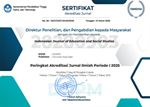Alpaslan, C. M., & Mitroff, I. I. (2021). Exploring the Moral Foundations of Crisis Management. Technological Forecasting and Social Change, 167, 120713. https://doi.org/10.1016/j.techfore.2021.120713
Brown, C., & Shay, M. (2021). From Resilience to Wellbeing: Identity-Building as an Alternative Framework for Schools’ Role in Promoting Children’s Mental Health. Review of Education, 9(2), 599–634. https://doi.org/10.1002/rev3.3264
Chatzopoulou, E., & Navazhylava, K. (2022). Ethnic Brand Identity Work: Responding to Authenticity Tensions through Celebrity Endorsement in Brand Digital Self-Presentation. Journal of Business Research, 142, 974–987. https://doi.org/10.1016/j.jbusres.2022.01.020
Fekih Zguir, M., Dubis, S., & Koç, M. (2021). Embedding Education for Sustainable Development (ESD) and SDGs Values in Curriculum: A Comparative Review on Qatar, Singapore and New Zealand. Journal of Cleaner Production, 319, 128534. https://doi.org/10.1016/j.jclepro.2021.128534
Florio, M. (2021). European and International Perspectives on Benefit-Cost Analysis: Symposium Introduction. Journal of Benefit-Cost Analysis, 12(1), 55–63. https://doi.org/10.1017/bca.2020.35
Jubba, H., Pabbajah, M., Abdullah, I., & Juhansar. (2021). Reorienting Moral Education for Millennial Muslims: The Changing Role of Islamic Boarding Schools in Indonesia. Islamic Quarterly, 65(3), 423–441.
Kawakip, A. N., & Sulanam. (2023). The Practice of Shared Values and Islamic Educational Identity: Evidence from a Pesantren in East Java, Indonesia. Journal of Indonesian Islam, 17(1), 27–53. https://doi.org/10.15642/JIIS.2023.17.1.27-53
Kiger, M. E., & Varpio, L. (2020). Thematic Analysis of Qualitative Data: AMEE Guide No. 131. Medical Teacher, 42(8), 846–854. https://doi.org/10.1080/0142159X.2020.1755030
Köhler, T., Smith, A., & Bhakoo, V. (2022). Templates in Qualitative Research Methods: Origins, Limitations, and New Directions. Organizational Research Methods, 25(2), 183–210. https://doi.org/10.1177/10944281211060710
Matthews, R. (2020). New Times, New Crimes: Notes on the Depillarization of the Criminal Justice System. Critical Criminology, 28(3), 309–326. https://doi.org/10.1007/s10612-020-09489-2
Mazzocchi, F. (2022). Diving Deeper into the Concept of ‘Cultural Heritage’ and Its Relationship with Epistemic Diversity. Social Epistemology, 36(3), 393–406. https://doi.org/10.1080/02691728.2021.2023682
McCormack, L., & Lowe, B. (2022). Making Meaning of Irreconcilable Destruction of Innocence: National Humanitarian Professionals Exposed to Cybercrime Child Sexual Exploitation in the Philippines. Child Abuse and Neglect, 131, 105770. https://doi.org/10.1016/j.chiabu.2022.105770
Mhlanga, D., Denhere, V., & Moloi, T. (2022). COVID-19 and the Key Digital Transformation Lessons for Higher Education Institutions in South Africa. Education Sciences, 12(7), 464. https://doi.org/10.3390/educsci12070464
Mohamed Hashim, M. A., Tlemsani, I., & Matthews, R. (2022). Higher Education Strategy in Digital Transformation. Education and Information Technologies, 27(3), 3171–3195. https://doi.org/10.1007/s10639-021-10739-1
Mohiuddin, M., Hosseini, E., Faradonbeh, S. B., & Sabokro, M. (2022). Achieving Human Resource Management Sustainability in Universities. International Journal of Environmental Research and Public Health, 19(2), 928. https://doi.org/10.3390/ijerph19020928
Mujahid, I. (2021). Islamic Orthodoxy-Based Character Education: Creating Moderate Muslim in a Modern Pesantren in Indonesia. Indonesian Journal of Islam and Muslim Societies, 11(2), 185–212. https://doi.org/10.18326/ijims.v11i2.185-212
Muzammil, S., Taufik, E. T., Mufidatunrofiah, S., & Al Amin, N. U. (2022). The Adaptability of Pesantren in Indonesia During the New Normal Era. Journal of Indonesian Islam, 16(2), 426–454. https://doi.org/10.15642/JIIS.2022.16.2.426-454
Pazienza, M., de Jong, M., & Schoenmaker, D. (2022). Clarifying the Concept of Corporate Sustainability and Providing Convergence for Its Definition. Sustainability (Switzerland), 14(13), 7838. https://doi.org/10.3390/su14137838
Pike, M. A., Hart, P., Paul, S. A. S., Lickona, T., & Clarke, P. (2021). Character Development through the Curriculum: Teaching and Assessing the Understanding and Practice of Virtue. Journal of Curriculum Studies, 53(4), 449–466. https://doi.org/10.1080/00220272.2020.1755996
Pizzutilo, F., & Venezia, E. (2021). On the Maturity of Social Responsibility and Sustainability Integration in Higher Education Institutions: Descriptive Criteria and Conceptual Framework. International Journal of Management Education, 19(3), 100515. https://doi.org/10.1016/j.ijme.2021.100515
Puad, L. M. A. Z., & Ashton, K. (2023). A Critical Analysis of Indonesia’s 2013 National Curriculum: Tensions Between Global and Local Concerns. Curriculum Journal, 34(3), 521–535. https://doi.org/10.1002/curj.194
Pyo, J., Lee, W., Choi, E. Y., Jang, S. G., & Ock, M. (2023). Qualitative Research in Healthcare: Necessity and Characteristics. Journal of Preventive Medicine and Public Health, 56(1), 12–20.
Sharma, R., Jones, K., Anderson, W., Inthiran, A., & Tabatabaee, M. (2022). The Digital Transformation of Higher Education–“Uni for Nothin’, MOOCs for Free”? Journal of Information Technology Case and Application Research, 24(1), 34–60. https://doi.org/10.1080/15228053.2021.1889741
Shultz, C., Hoek, J., Lee, L., Leong, W. Y., Srinivasan, R., Viswanathan, M., & Wertenbroch, K. (2022). JPP&M’s Global Perspective and Impact: An Agenda for Research on Marketing and Public Policy. Journal of Public Policy and Marketing, 41(1), 34–50. https://doi.org/10.1177/07439156211049216
Tan, P. L., Rasoolimanesh, S. M., & Manickam, G. (2022). How Corporate Social Responsibility Affects Brand Equity and Loyalty? A Comparison Between Private and Public Universities. Heliyon, 8(4). https://doi.org/10.1016/j.heliyon.2022.e09266
Thompson, D., & Meer, N. (2021). Blurring the Boundaries of Formative and Summative Assessment for Impact on Learning. Practitioner Research in Higher Education, 14(1), 28–40.
Tri, N. M., Hoang, P. D., & Dung, N. T. (2021). Impact of the Industrial Revolution 4.0 on Higher Education in Vietnam: Challenges and Opportunities. Linguistics and Culture Review, 5(S3), 1–15. https://doi.org/10.21744/lingcure.v5ns3.1350
Wang, D. C., Reed, A., Greggo, S., Bowersox, L., Drennan, A., Strawn, B., King, P. E., Porter, S. L., & Hill, P. C. (2023). Spiritual Formation in Theological Education: A Multi-case Exploration on Seminaries and Student Development. Christian Education Journal, 20(1), 65–86. https://doi.org/10.1177/07398913231177722
 (Universitas Nurul Jadid)
(Universitas Nurul Jadid) 



